Dialogue on Social Sciences and Immunization

Michael J Deml (Postdoctoral Researcher, University of Cape Town, University of Geneva)
Main image: Dr. Michael J. Deml, Dr. Jennifer Githaiga, Esther Lermytte, and Dr. Vladimir Jolidon strike a pose before the dialogue to discuss the event
Editorial note: Sponsored by a Research Partnership Grant I from Lead House Africa, I had the great pleasure of organizing and hosting an open Dialogue on Social Sciences and Immunization on 30 Nov and 01 December 2022. In this edition of Fieldnotes, we invite you to engage with some of the materials from the dialogue.
Sponsored by a Research Partnership Grant I from Lead House Africa, I had the great pleasure of organizing and hosting an open Dialogue on Social Sciences and Immunization on 30 Nov and 01 December 2022. The project, entitled “Disentangling social inequalities around access and vaccine hesitancy for COVID-19 vaccination,” involved: (1) the conduct of a scoping literature review on COVID-19 vaccine attitudes, uptake, and access in Sub-Saharan Africa, (2) a round table discussion at the University of Geneva in April 2022, and (3) an open Dialogue on Social Sciences and Immunization with the Division of Social and Behavioural Sciences within the School of Public Health at the University of Cape Town. This edition of Fieldnotes focuses on the third project output.
The objective of the Dialogue was to gather researchers, practitioners, and policymakers interested in vaccination decision-making and vaccination service research. We heard from a diverse group of speakers who employ social science methodologies and theories in their research. We also heard from two speakers who founded Vaxi Taxi, which repurposed underutilized ambulances from the Western Cape’s Emergency Medical Services to implement mobile COVID-19 vaccination services in the Western Cape of South Africa.
In this edition of Fieldnotes, we invite you to engage with some of the materials from the dialogue.
In this audio file, you can learn more about the event and hear directly from researchers and dialogue attendees. Toward the end of the clip, you can hear about the contributions of social sciences to the field of immunization services.
For an overview of the content of the dialogue, you can consult the programme and abstract booklet. Some of the presentations are available as well.
Here, I would like to feature some snapshots I took during the dialogue, with some notes about the content from the participants’ presentations and interactions.
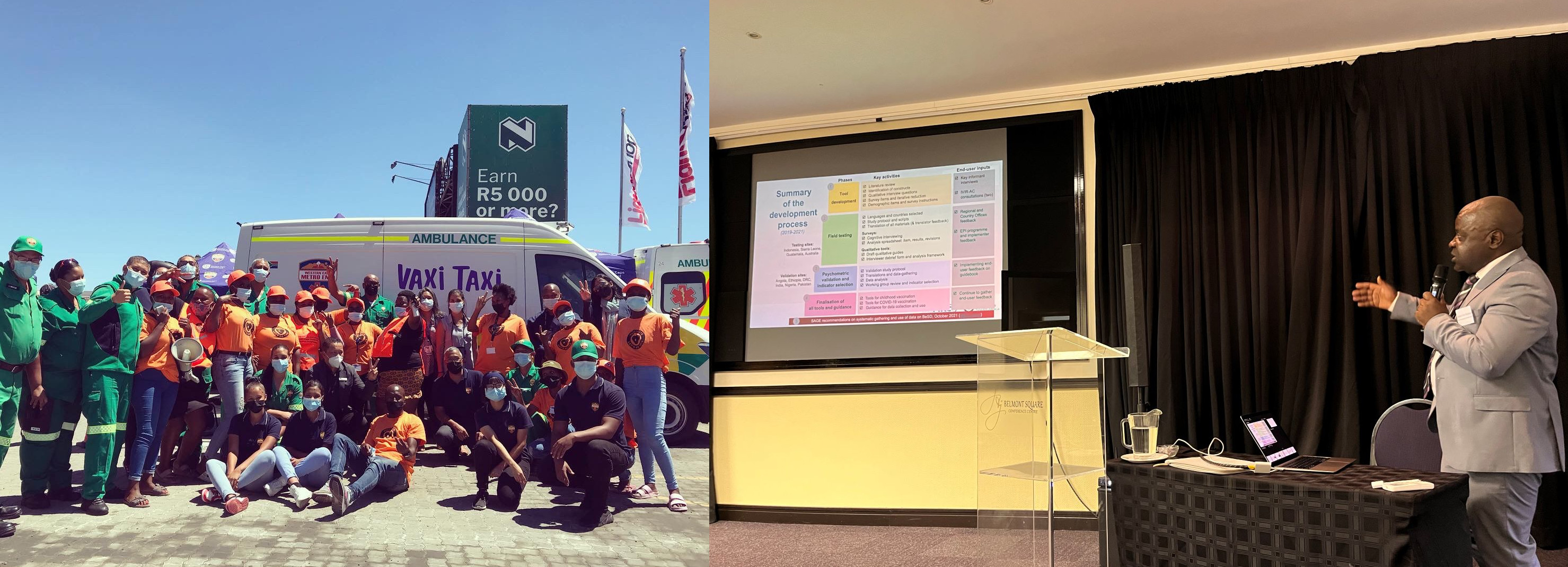
Left: Vaxi Taxi
Right: Prof. Dr. Charles Shey Wiysonge from Cochrane South Africa and the South African Medical Research Council presents a framework for behavioural and social drivers of vaccination.
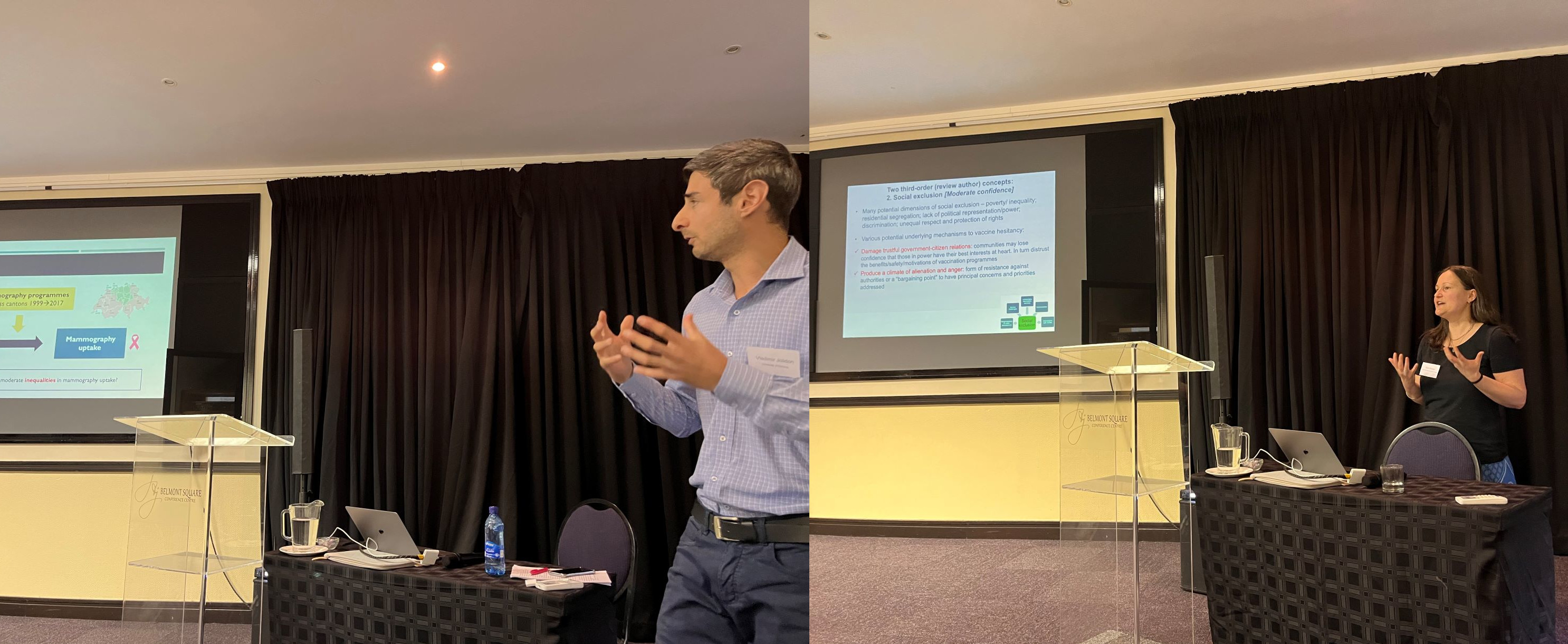
Left: Dr. Vladimir Jolidon from the Institute of Sociological Research at the University of Geneva in Switzerland discusses results from his doctoral dissertation and provides insight into the advantages of using multilevel models for understanding preventive health service use.
Right: Associate Professor Dr. Sara Cooper from Cochrane South Africa, the South African Medical Research Council, and Stellenbosch University discusses her research, which involved qualitative evidence synthesis on vaccine hesitancy.
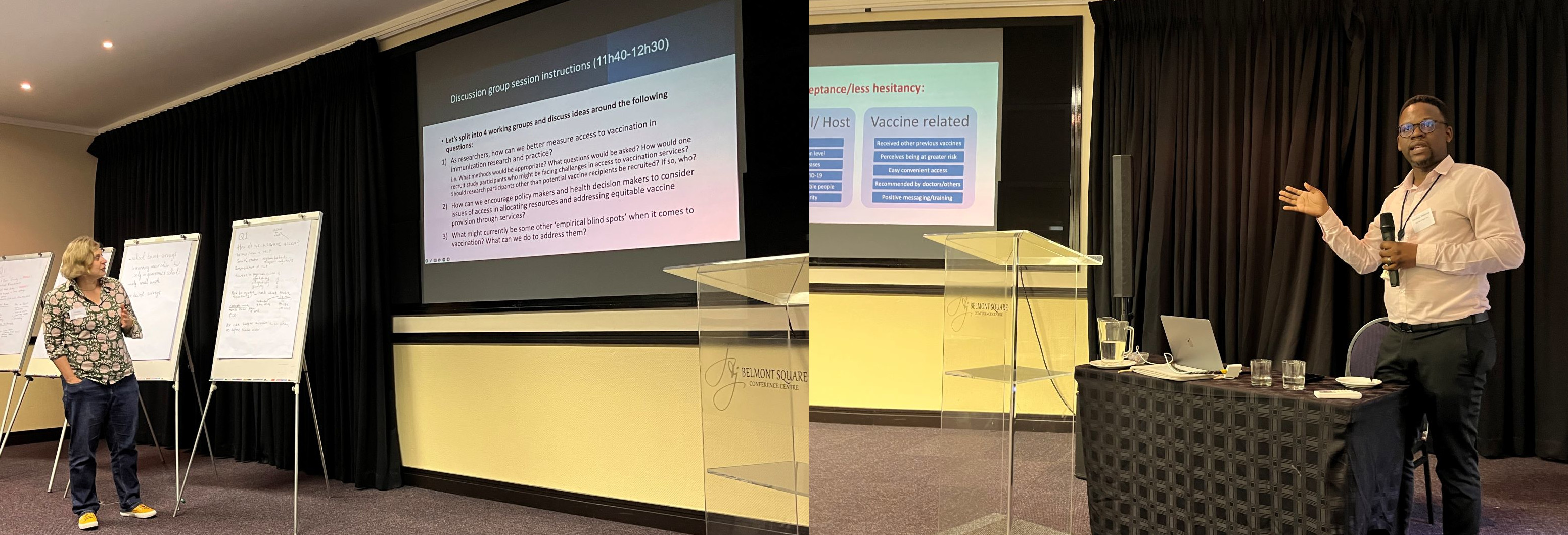
Left: Sara Dane, Master of Public Health student within the Division of Social and Behavioural Sciences at the University of Cape Town, shares what her group had discussed during a discussion group exercise focusing on access to vaccination services in Sub-Saharan Africa.
Right: Dr. Itumeleng Ntatamala, who works in the Occupational Medicine Division at the University of Cape Town, presents about a review of the literature on vaccine hesitancy among non-health workers and notes policy considerations about COVID-19 vaccination requirements in the workplace.
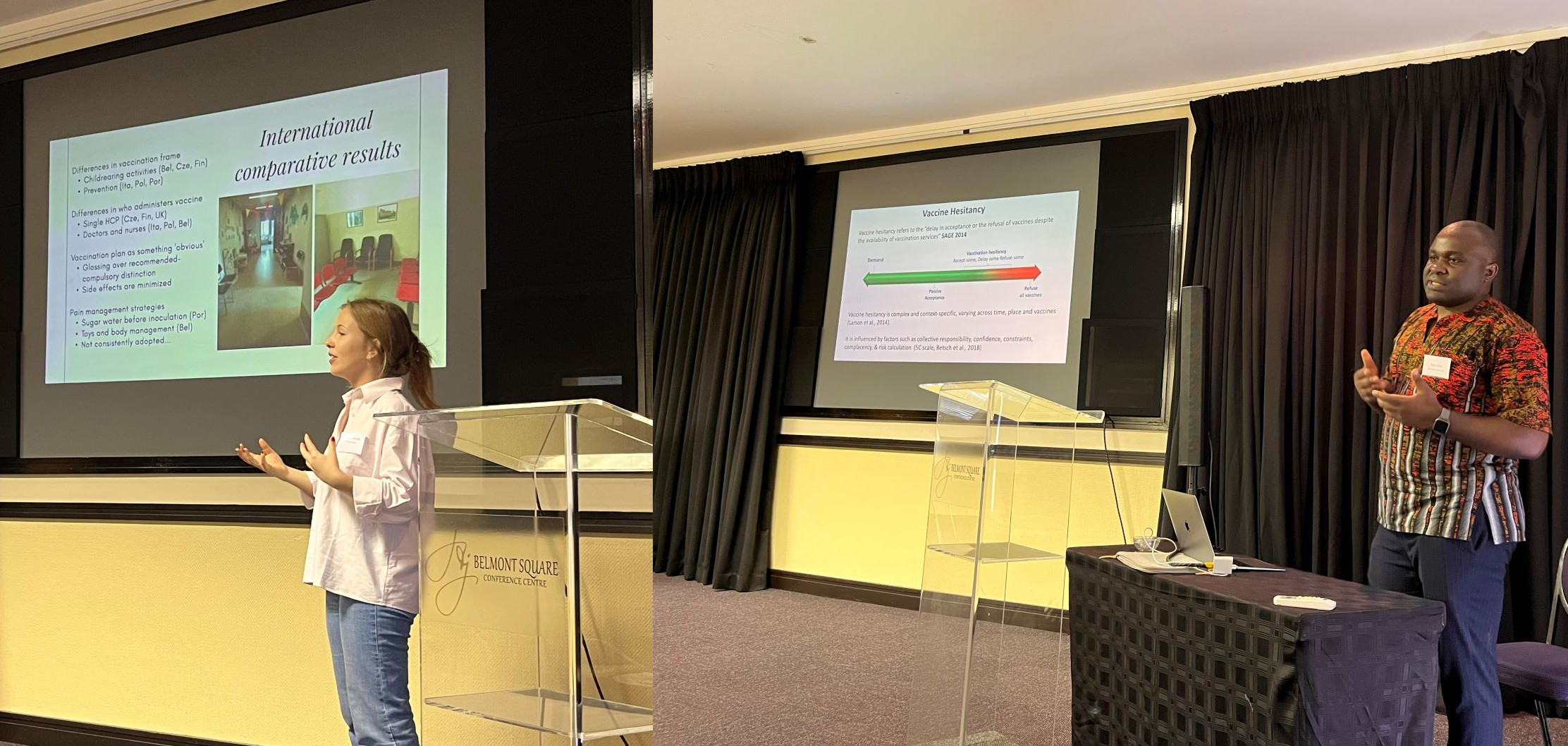
Left: Esther Lermytte, who is a PhD Candidate in sociology at Ghent University, provides a European perspective by presenting qualitative findings with healthcare practitioners from 7 European countries.
Right: Associate Professor Dr. Muki Shey explains how he incorporates the complex concept of vaccine hesitancy into his research on factors influencing COVID-19 and influenza uptake and hesitancy among healthcare workers.
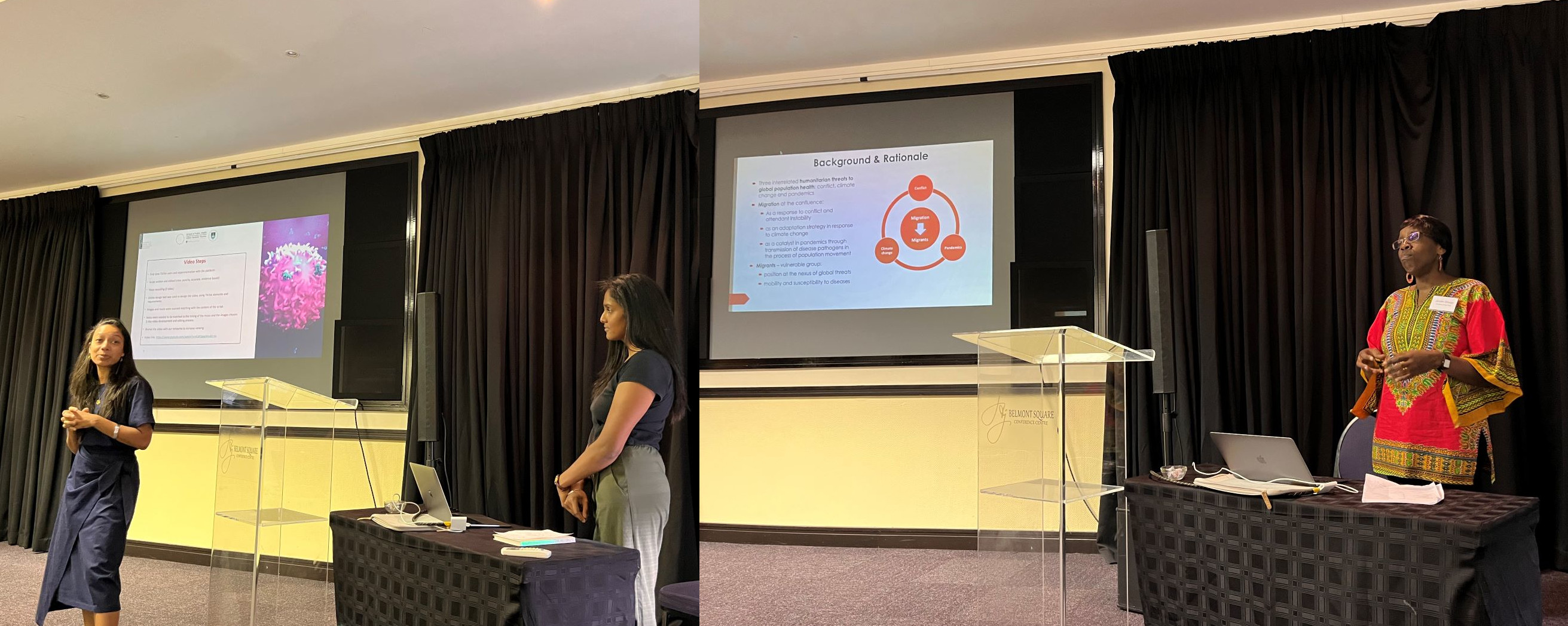
Right: Natasha Kannemeyer and Shehani Perera, who are both doctoral candidates within the Division of Social Behavioural Sciences at the University of Cape Town, present their successful TikTok vaccination campaign, which won best prize at the Public Health Association of South Africa (PHASA) conference in 2022. More about their video can be seen here.
Left: Dr. Jennifer Githaiga, lecturer within the Division of Social and Behavioural Sciences at the University of Cape Town, shares preliminary findings from a scoping review on immunization programmes for migrant and refugee populations. She is conducting this research in pursuit of her Master of Public Health degree at the University of Cape Town.
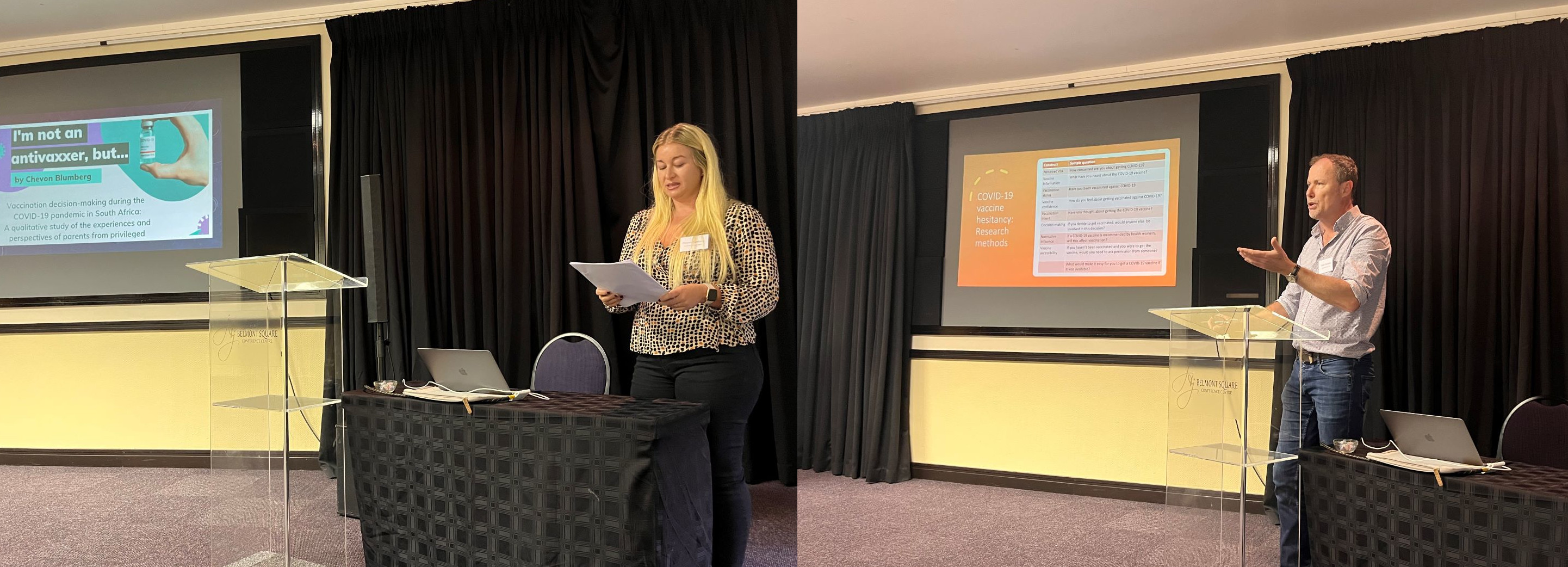
Left: Dr. Chevon Blumberg, who is a Master of Public Health student within the Division of Social and Behavioural Sciences at the University of Cape Town, discusses her master’s degree research, which is a qualitative study on the vaccination attitudes and practices of privileged parents in the Western Cape of South Africa.
Right: Associate Professor Dr. Peter Delobelle from the Chronic Disease Initiative for Africa at the University of Cape Town shares qualitative findings from a study on COVID-19 vaccine acceptance among healthcare workers in the context of the Sisonke clinical trial in the Cape Town Metro.

Right: Dr. Brendan Maughan-Brown, who is an Associate Professor with the Southern Africa Labour and Development Research Unit (SALDRU) at the University of Cape Town, elaborates on findings from the CVACS (COVID-19 Vaccine Survey) study, which is a longitudinal survey into COVID-19 vaccine uptake and attitudes in South Africa.
The dialogue was a smashing success, with many fruitful discussions, both during question-and-answer rounds after the presentations, discussion groups about measuring access to vaccination services, and through informal discussions over tea, coffee, and lunch. We look forward to continuing the dialogue in the future, so please feel free to get in touch if you have any comments or questions about social sciences and vaccination research.
Author Biography: Michael Deml is a Swiss National Science Foundation Early Postdoc Mobility researcher with the Institue for Sociological Research at the University of Geneva and the Division of Social and Behavioural Sciences, School of Public Health at the University of Cape Town. His interests lie in infectiuos disease prevention and understanding vaccine hesitancy and vaccine decisions.
Email: michaeljdeml@gmail.com